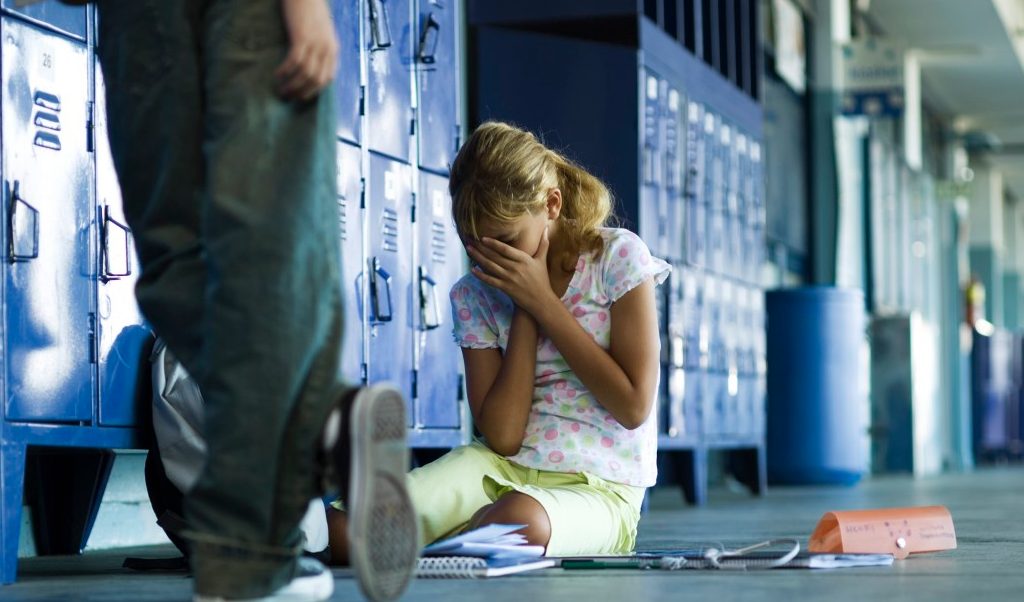How to Deal with Bullies

Learn the warning signs that your child might be a victim of bullying, how to deal with bullies, and help your child have a better, healthier childhood.
If you’re the parent of a middle or high school student, there’s a good chance your child has been bullied or has witnessed it happening. About 20 percent of 6th through 12th graders say they’ve been the victims of bullying.
YOU MIGHT ALSO LIKE: Stress Relief for Assessment Testing Overload
What is a bully?
A bullied child may not have been hit, punched, or kicked. Bullying isn’t always physical, but it may be even more damaging than child abuse. Name calling, rumor spreading, and sending nasty messages via text or social media are also forms of intimidation. The problem is that the bully is in control, the behavior is intentionally mean, and it happens more than once.
A bully’s cruelty can have serious and lasting repercussions on not only the target but also the bully and witnesses.
“Depression, anxiety, peer problems, and academic problems are all associated with bullying, both in the short term and in the long term,” says Elizabeth Englander, PhD, professor of psychology at Bridgewater State University and director of the Massachusetts Aggression Reduction Center.
Signs of bullying
If your child is being bullied, he or she might not come right out and tell you. In fact, fewer than half of kids who’ve been bullied turn to an adult because they fear retaliation or embarrassment, or they think no one will care.
You need to be vigilant for the warning signs, which aren’t always obvious. Lack of interest in food, trouble sleeping, less time spent with friends, and general anxiety are all cues, but they can also be signs of several different issues.
“Parents should look for signs of distress in their child, and then talk with them to determine what the source of the problem is,” Englander says. Kids won’t always be upfront when confronted. “You may need to have this conversation several times before you begin to see what’s really bothering them.”
YOU MIGHT ALSO LIKE: Bullying May Be Worse than Child Abuse
How to deal with bullies
“If a child is being bullied, parents shouldn’t despair. Instead, they should focus on shoring up their child’s supports,” Englander suggests. Those supports include a loving family, caring friends, and teachers who can step in and offer help when your child needs it.
At home, role play ways to respond to the bully, which might include telling the person to “Cut it out,” walking away, or using humor to diffuse the situation. If the bullying doesn’t blow over or seems to be escalating, step in.
Many states have anti-bullying laws that require schools to investigate and respond to bullying and protect the kids who report it. Work with your child’s teachers, guidance counselor, and principal to find an agreeable solution. Stay involved until you’re sure the problem has been resolved.
If your child is a bully
The news that your child is a bully can be even harder to take. Yet it doesn’t mean you — or your child — is a failure, Englander says. “Many children try out bullying to see if it gets them ahead socially.”
That said, you do need to address the problem. First, find out why your child is acting this way. Did he or she mean to hurt the other person? Was it just fooling around without realizing the repercussions? Make it clear that such behavior — whatever its reasons — is unacceptable. Set clear consequences for bullying, like losing computer time or missing out on a trip to the movies.
Consider whether any problems might lie under the surface of your child’s bullying. He or she might be lashing out because of stress at school or self-consciousness from recently gaining weight. Steer your child in healthier directions, like sports or an after-school club. If your child still needs extra help, talk to a pediatrician, and make an appointment with a therapist or counselor.
To learn more ways to deal with bullying, visit PACER’s National Bullying Prevention Center, or StopBullying.gov.
Updated:
February 01, 2023
Reviewed By:
Janet O’Dell, RN